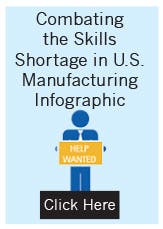US Manufacturers Need Flexible Operations to Secure Their Future
Given the continued proliferation of customer needs and tastes, emerging new technologies and rising instability in geo-politics and weather patterns, instilling greater flexibility in operations will be essential to a successful future for manufacturing companies.
For example, manufacturers must be able to respond swiftly, moving production from one facility to another or even changing the product mix or quantity produced at a facility to keep pace with demand and new customer demands.
A new Accenture Manufacturing Flexibility Index has been developed to measure the state of manufacturing’s operational flexibility along three dimensions: the use of emerging digital/connected technologies; the management of their physical assets; and importantly, the strength of the skills within their manufacturing workforces.
Looking at those results in aggregate to compare the degree of operational flexibility that manufacturers have achieved on a country and even a regional basis, the U.S. scored reasonably well, but it trailed Brazil and China. However, closer regional examination revealed that manufacturers in the Northeast, South and West have achieved greater operational flexibility than those in the Midwest.
While all things are not equal, it might be said that digital has the potential to be the great equalizer. U.S. companies could benefit from a stronger focus on the use of digital strategies and technologies, as they develop business plans for the future. For instance, they could:
- Implement digital asset reliability and performance capabilities. These capabilities – based on technologies such as analytics, telemetry and the use of cloud-based systems – can revolutionize the way managers use their assets. They help manufacturers regularly monitor and understand the reliability of their assets, so that manufacturers can structure and schedule maintenance activities when they have the least impact on production. Wireless sensors and mobile apps also can help manufacturers enhance plant safety and monitor product performance in the field, creating new revenue producing services.
- Adopt technologies, such as automation, robotics, simulation and 3D printing, to improve operational productivity and efficiency. While these technologies have been around for many years, their reliability, flexibility and cost of ownership have changed sufficiently to ease their integration into existing operations.
- Construct control towers to enhance performance and provide better decision support. They also can give manufacturers greater visibility across all dimensions of their operations networks, including demand, capacity, inventory, orders and/or shipments in transit, and logistics partners. Control towers also can help manufacturers use predictive analytics to make sense of the data they collect, providing windows into new business opportunities while offering insights for improving existing operations.
Admittedly, ramifications also exist for talent as digital technologies and digital factories become more prevalent. As found in our study completed with The Manufacturing Institute, “Out of Inventory: Skills Shortage Threatens Growth for U.S. Manufacturers,” new technology requirements are increasing expectations of the manufacturing workforce. Sixty percent of the 300 U.S. manufacturing executives surveyed reported that they had found it difficult to hire people with the skills they need.
So for those U.S. manufacturers who look to grow and increase their profitability in today’s volatile business environment, digital technologies and capabilities will be essential to achieving the operational flexibility they desire and need. Operational flexibility can be achieved by taking concerted steps toward that end. To quote a famous physicist from the last century: “Without change there is no innovation, creativity, or incentive for improvement. Those who initiate change will have a better opportunity to manage the change that is inevitable.”
Increased flexibility and productivity is exactly what U.S. manufacturers need as they seek to grab a larger share of the world’s industrial pie. In addition, it will take innovation and creativity to create new flexible operating structures that can help manufacturing companies surpass their competition on the world stage.
Cv Ramachandran is a managing director for Accenture Strategy, North America. Whether it's business strategy, technology strategy or operations strategy, Accenture Strategy drives value, shapes new businesses and designs operating models for the future.


